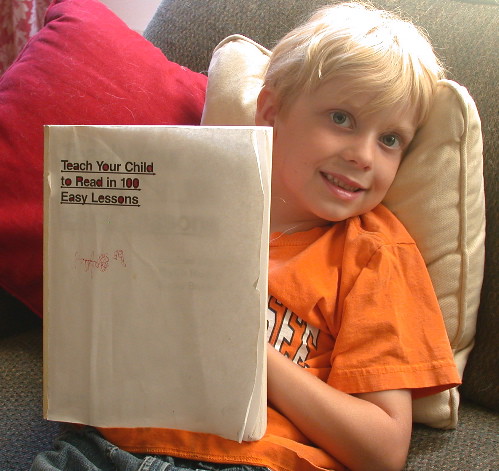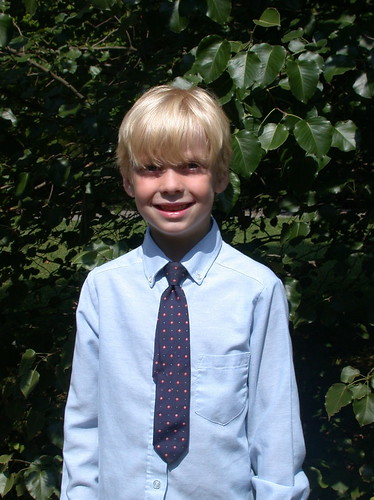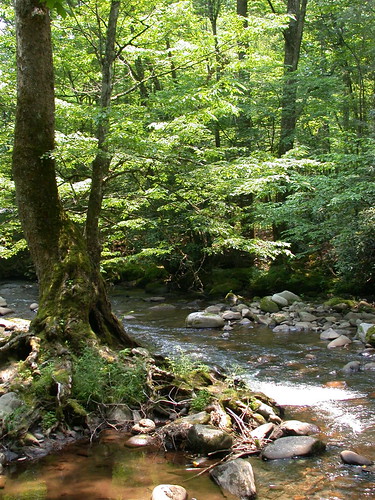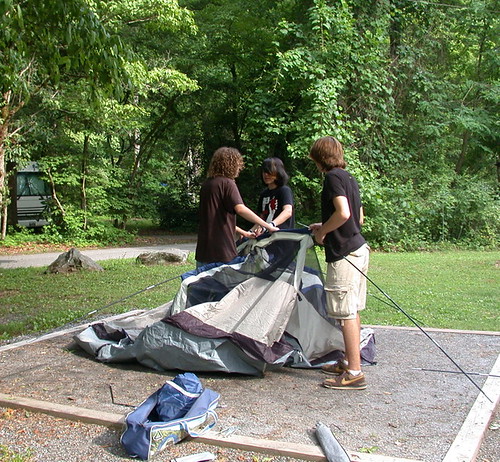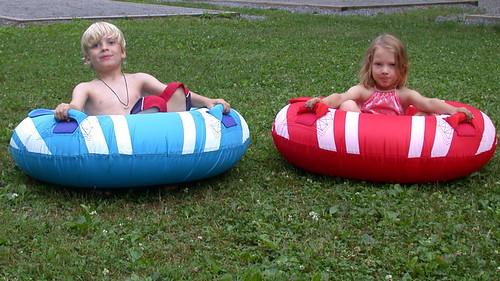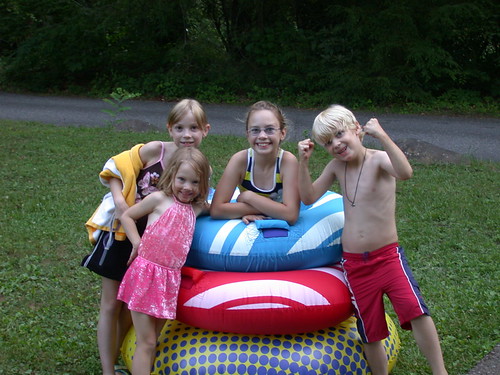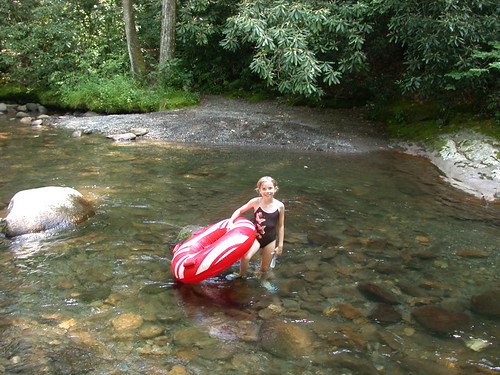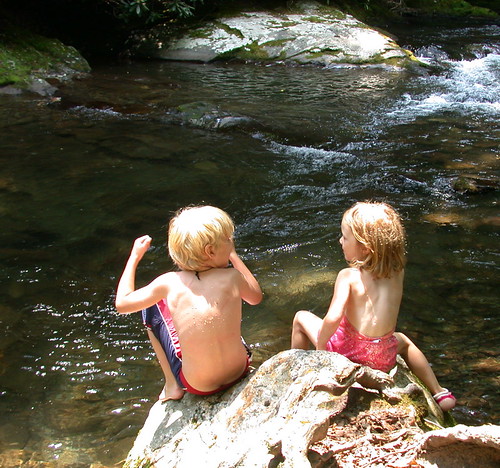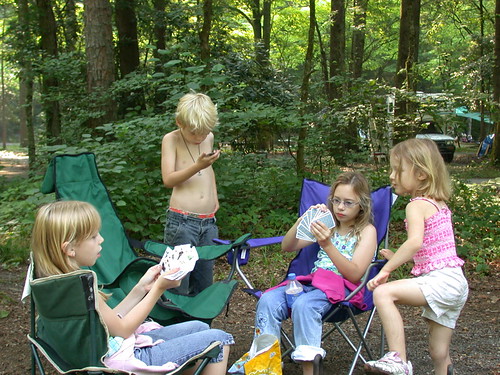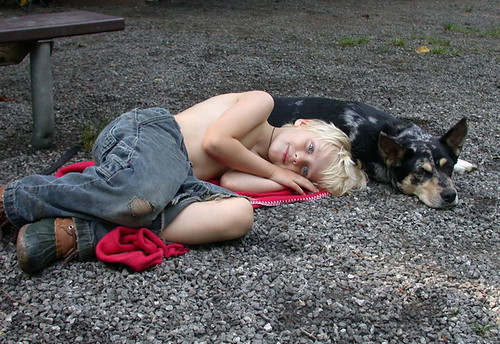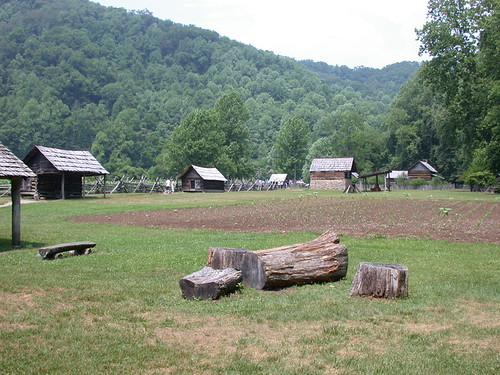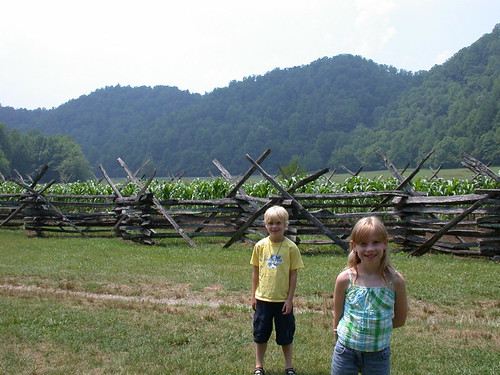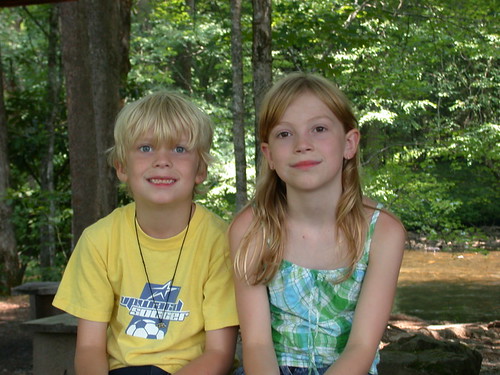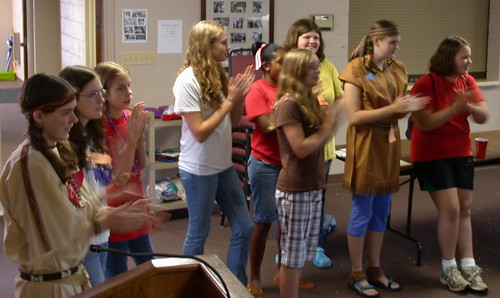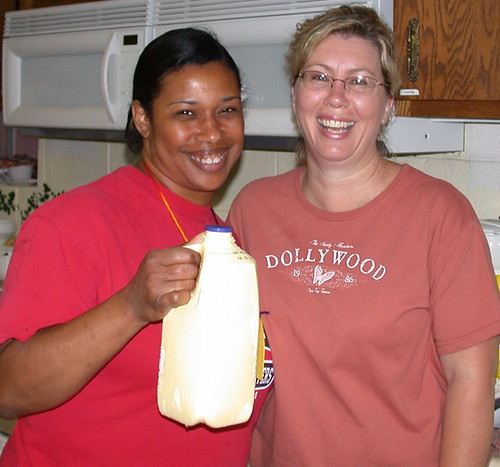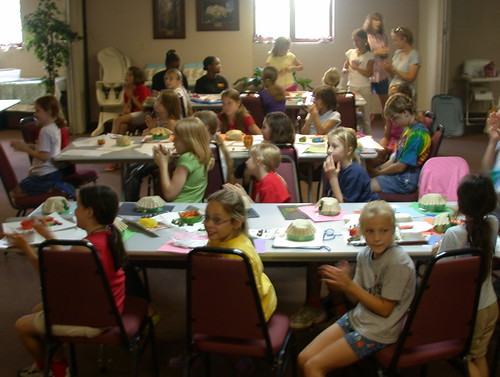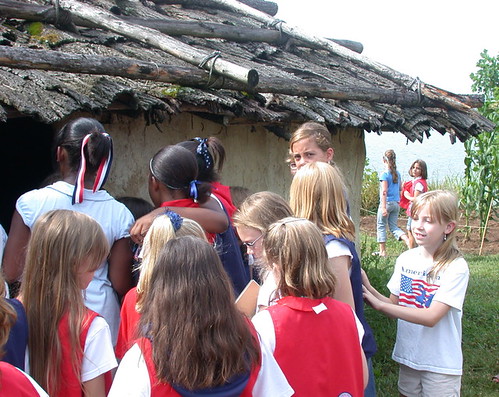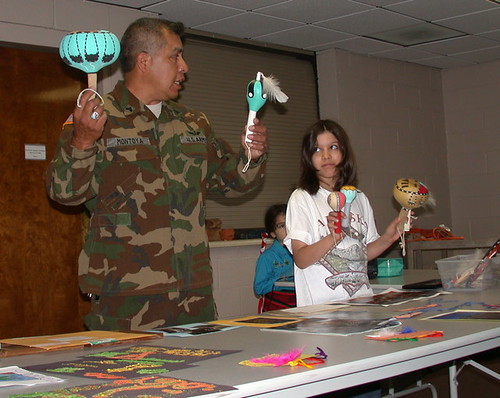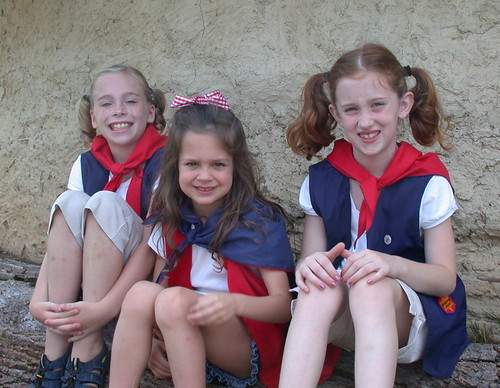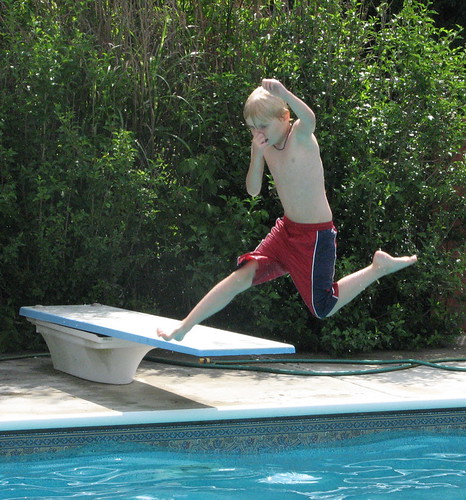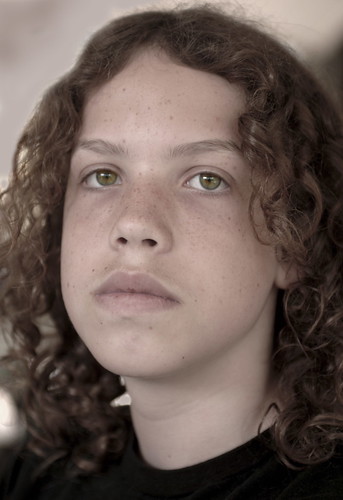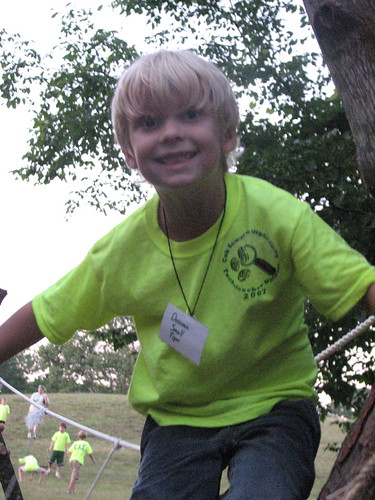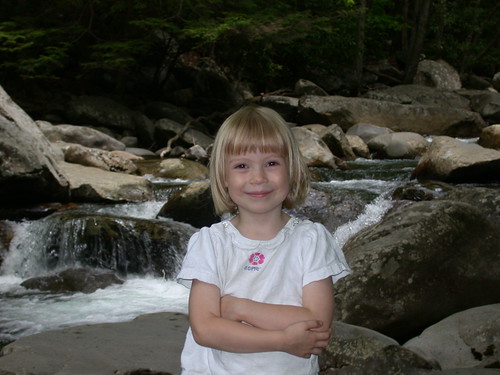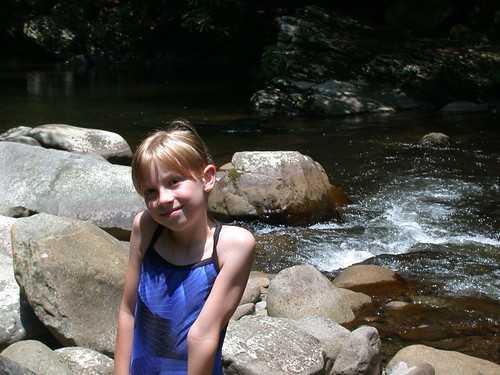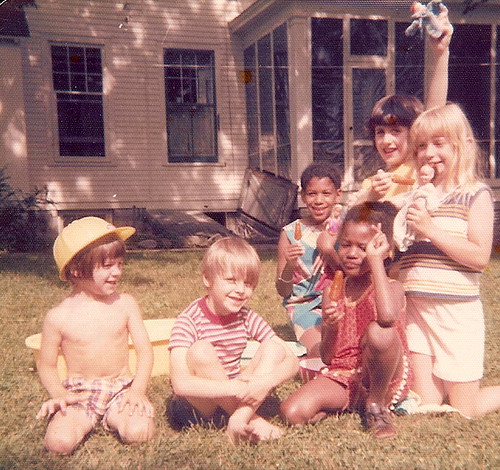June 7, 2007
I think it’s fun to translate edu-speak into life at home. When I was in college, I certified to teach at the secondary level. I had to take all kinds of education courses, of course (but not nearly as many as primary school teachers). I was in a state of perpetual confusion (no comments, please), because I remember always thinking, “Why do education professionals have to come up with complicated terms for simple things?”
Just out of curiousity, I was scouting around to see the scope and sequences listed in various school systems. These excerpts of one from a Connecticut school seem fairly universal but put plainer than many. I was not surprised to see that Duncan has, in simple terms, passed kindergarten...
Art
Through aesthetic experiences and hands-on activities, both two-dimensional and three dimensional, which emphasize perception and sensitivity, art production, art history, art criticism and appreciation, students gain heightened self-awareness and an important body of knowledge. The fundamentals are taught through the use of mixed media, painting and printing techniques along with the exploration of simple clay and construction projects. Fine motor skills are strengthened along with listening, problem-solving and socialization skills…. Children develop their visual and tactile abilities as they produce works in various media in response to varied stimuli. …
As youngsters learn that art is enjoyable and each child’s work is unique, they become aware of the positive aspects of criticism and learn to value art. …
In other words… Duncan loves art. He knows all his colors, including Macaroni and Cheese. He can cut, glue, staple, make cool stuff with play-dough, paint, color, draw, make all kinds of two- and three-dimensional creations using his imagination and our box of inventing supplies. He likes his artwork. He wants it to be hung on the bulletin board. He appreciates his siblings’ artwork, as well. He definitely values art.
Computer
The Technology Applications Curriculum has four strands: Foundations, Information Acquisition, work in Solving Problems and Communication. The Foundations Strand addresses use of technology related vocabulary, concepts and strategies. The Information Acquisition Strand includes the identification of task requirements; the plan for using search strategies and the use of technology to access, analyze and evaluate the acquired information. The Solving Problems Strand involves students in individual and group tasks that require them to select the technology appropriate to the task, synthesize knowledge, create a solution and evaluate the results. The Communications Strand includes tasks that require students to make appropriate selections of formats and use the tools to communicate information to diverse audiences. Students will have opportunities through a variety of assured experiences integrated into the daily exploration of curriculum topics to apply and practice these skills. …
In other words….Duncan loves the computer. He does all kinds of stuff on it. He knows how to insert and eject a CDROM, find a few approved websites, and type his name. He even has a blog. The computer is just part of our everyday life, and someone is almost always on it!
Health
Students will learn safety rules to be followed in the classroom, on the playground, in a car and on the bus. They will learn about potentially hazardous situations at home and school and the procedures to follow in the event an emergency does occur. … The importance of eating a good breakfast will be emphasized and youngsters will identify nutritious snacks. Many areas of human growth and development will be explored including dental hygiene, personal grooming and how the body changes as one grows. Children will discuss different kinds of families, how families change and how families work together. In discussions about basic feelings, youngsters will learn how people affect other people’s feelings. Children will describe feelings and discover healthy ways to handle their feelings. Children learn about the helpful and harmful effects of drugs. …Children talk about characteristics of colds and ways to prevent them as well as identifying other contagious diseases (e.g. AIDS) and non-contagious diseases. In accordance with State Statutes (C.G.S. 10-16e and P.A. 88-112), parents who wish to exempt their children from AIDS or Family Life Education can do so by submitting a written request to their building principal. However, it is our strong recommendation that all students receive this education.
In other words….Duncan knows that gaping wounds require stitches, smaller ones require band-aids. He tries to stay out of poison ivy. He doesn’t tease dogs. He blows his nose and covers his mouth when he coughs, usually. He knows that when he puts his fingers in his mouth and nose, that he might be inserting the germs of some really gross kid who also picked his nose. He washes his hands when we come back from Walmart. He usually washes his hands after he uses the bathroom and before we eat. He doesn’t know anything about AIDS. We didn’t have to submit a written request to the building principal. And he knows about how families work together.
Language Arts
Our goal is to have students become life-long readers who use language effectively for communication, learning, and enjoyment. Our program provides many opportunities throughout the day for students to self-select books, to reflect and interact with print through personal response, and to discuss literature with the teacher and with one another. …Westport’s approach includes a wide range of fiction and nonfiction material from all subject areas. This allows students to read for enjoyment as well as to increase their background knowledge needed to read new texts.…
In other words…Duncan loves books. He loves to thumb through books that he “self-selects.” He loves to be read to. He thinks about books and talks about them. He looks forward with great joy to his bedtime reading with Daddy. He is making huge progress with his own reading, and sounds out billboards, which isn't always a good thing.
Library
The mission of the school library media program is to ensure that teachers and students are effective users of information and ideas. … The library media curriculum works best when it is integrated with the classroom curriculum. To this end, teachers and library media specialists are encouraged to collaborate and students use the library at all times during the day as well as during regularly scheduled classes.
In other words…Duncan's been a library regular since infancy. We go to the library most weeks. We hang out, check out books, play on the computer. We try to remember to bring our books back on time. And in case we run out of library books, we have our own home library, with bookshelves in every room.
Mathematics
In kindergarten, mathematics is usually viewed not as a separate subject, but as an integral part of daily activities. Number sense and numeration are developed through constant counting, starting with attendance and carrying through with the interpretation of graph data. … Children look for patterns throughout the day whether it is through a science investigation with leaves or the recognition of changing shapes and colors. As children have more experience with sorting and classifying, they start to notice similarities and differences in things around them and patterns appear everywhere. … Pattern blocks, geoboards, tangrams and other building materials provide rich experience in developing spatial awareness and an understanding of geometry. Throughout all of the specific skill strands, we emphasize thinking skills as children solve problems which arise naturally throughout the day. The children are encouraged to use mathematical language to communicate their thinking and to explain their reasoning. In all activities, we hope to help children gain confidence in their own mathematical abilities.
In other words…Math happens everywhere in our home. Sometimes through a math workbook, more often through dividing a bag of M&Ms into equal parts among three siblings. A quarter is more than a penny, but pennies are nice, too. You need 2 quarters to buy a gangsta necklace from the candy machines at Walmart.
Music
Music Education should provide the opportunity for students to perform, create, and respond to music. Through singing, playing instruments, moving and creating music, students will acquire musical skills and knowledge. Learning to read and notate music allows students to explore music independently and with others. The study of music develops self-awareness through aesthetic experiences. It develops an appreciation for the students’ own history and cultural heritage and that of the global society.
In other words…music is everywhere. Folk, rock, Americana, country, heavy metal, classical--everyone in our family has different tastes in music, and some kind of music is often playing in some room. Playing the recorder in one’s sister’s ear is annoying. Duncan dreams of playing the drums and a black electric guitar.
Physical Education
Physical education is an integral part of the general education program that significantly contributes to the total growth and development of each student, primarily through movement experiences. It is unique because it provides a balance of activities that reflect and challenge the divergent needs of students in the psychomotor, cognitive and affective domains. … Students are provided the opportunity to experience personal success, develop self-esteem, promote respect for others and acquire interpersonal skills. As physical educator we are committed to guiding our students to making healthy lifestyle decisions.
In other words…Duncan can run, jump, skip, and hop. He can swim, play soccer and catch a ball. He can ride a scooter and pedal a bike. He can hike on a trail and climb rocks in the mountains. He knows that being outside is much healthier than watching TV.
Science
The kindergarten curriculum offers many opportunities for students to become more aware of their senses and to use them to observe the world around them. By observing the patterns of seasonal changes, students will begin to understand the important concepts of change and continuity that allows scientists to interpret the past and sometimes predict future events. Humans and many other animals use their senses to gather information about the world. Students will identify their senses and use them throughout the year to make observations. A key concept is that people can often learn about things around them by making careful observations.
In other words…Duncan watches the clouds and comments on a beautiful sunset. He collects fall leaves and jumps into piles of them. He observes ants, snakes, and other critters. He helps me plant and care for flowers. He discusses seeds and growing. He mixes together substances just to see what will happen. He experiments with magnets, trying to see what all he can attach. He observes his big brother doing all kinds of interesting experiments...
Social Studies
Kindergarten social studies seeks to bring about a child's understanding of being an individual, a unique and valuable person; that each person is among many with similarities and differences. … Individuals develop unique identities that are determined by physical characteristics, talents and abilities, likes and dislikes, and feelings and attitudes. Individuals are members of a family with special relationships that might include mother/father, sister/brother, grandmother/grandfather, aunt/uncle niece/nephew, cousin, etc.
In other words… Duncan knows, by virtue of being in our family, that he is “a unique and valuable person.” He has friends of all shapes, sizes, and colors. He spends copious amounts of time with family members, including his grandparents. He has a strong sense of community.
The excerpts from the Westport school are about 1/16th of the actual requirements given for each subject. What struck me most is that all these rules, all these guidelines---it's just natural living. Developing one's unique identify. Learning to color. Observing the world around us. Going to the library. Interacting with people of all ages. It's just life, and I'm glad to have all my kids at home to help them navigate this journey--and to travel gladly with them.
Post A Comment!.....
Comments
Thursday, June 7, 2007 - Untitled Comment
 Posted by anotherblogonthefire (206.132.59.232)
Posted by anotherblogonthefire (206.132.59.232)
I am convinced that all of the fancy words and long-winded explanations are designed to impress and make you think that they know stuff.
If they put it all in simple terms, as you did so well, people might think, "Hey, I can do that... I'm going to homeschool."
This happens in construction all the time. The consultants put together big, thick binders with lots & lots of specifications that often have nothing to do with the project. They just pull together old specs and bind it up to make it look like they need to get paid lots for all of the work they did. They must get paid by the pound.
I like that Duncan knows that it is slightly more important to wash your hands when you come home from Walmart than it is to wash your hands after you go to the bathroom. At least when you go to the bathroom, you know where your hands have been!
One more thing... We find that Math & Library go hand in hand. Paying late fines is one way we like to support our local library!
Permanent Link Edit Delete
Thursday, June 7, 2007 - hey ...
 Posted by onfire (206.132.59.232)
Posted by onfire (206.132.59.232)
you are really brilliant, you know that?
k
Permanent Link Edit Delete
Friday, June 8, 2007 - And just yesterday....
 Posted by eclecticityTia (207.144.254.76)
Posted by eclecticityTia (207.144.254.76)
I had a nurse tell me a the doc's office that it made no sense to her why anyone would homeschool until at least middle school, "because you need the schools to teach them all that basic stuff first".
Yeah....okay. Excellent post. :-)
Permanent Link Edit Delete
Sunday, June 10, 2007 - Untitled Comment
 Posted by Anonymous (71.221.66.151)
Posted by Anonymous (71.221.66.151)
I absolutely love this post! Especially your last paragraph. Don't they know that is what life is all about?
Heidi at Mt Hope Academy
http://mthopeacademy.blogspot.com/
Permanent Link Edit Delete
Tuesday, June 12, 2007 - Great post
 Posted by Anonymous (74.210.28.43)
Posted by Anonymous (74.210.28.43)
I like this very much--hate educationalese too. I'll link back. Mama Squirrel at Dewey's Treehouse
